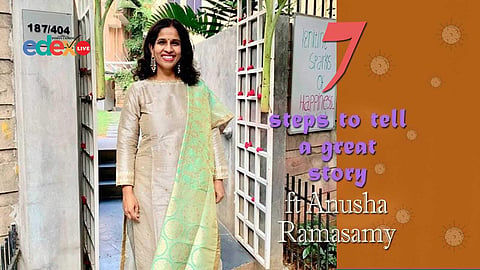

Anusha Ramasamy was running out of stories to tell her toddler — every time she tried to repeat a story, he would catch her right at the beginning and demand a new one. Her son was so obsessed with listening to stories that when it came to going to summer camp, he demanded to be sent to one where all he had to do was sit in a room and listen to a story.
"I searched all over the web but couldn't find the kind of summer camp he was asking for anywhere. That's when I decided I could do it myself. And instead of telling a story just to my son, I decided to call some friends over," narrates Anusha. After receiving great feedback from the parents, Anusha decided to get some training and worked under Dr Eric Miller, the storyteller, who later became her mentor. Soon after, Anusha set up Once Upon A Time — Tells a Tale, an organisation that conducts storytelling sessions for children and training sessions for amateur storytellers. And that's how Anusha has been making a name for herself in the storytelling world for the last six years.
Anusha is the perfect person whose brains we can pick when it comes to the art of storytelling — one, because she's one of the best in the city and is one of the most 'wanted' at events, TV shows and online too and two, because she was just another ordinary person who suddenly became interested and went on to become an expert! Anusha has a few tricks up her sleeve that make her a sought-after storyteller and she's agreed to let the cat out of the bag.
1. Infectious Enthusiasm - "The storyteller has to be super enthusiastic. That's the first rule. You have to be passionate about storytelling and your enthusiasm should be infectious," avers Anusha.
2. Convinced to be Convincing - Anusha says that it's important for the storyteller to be completely convinced by the story, if they aren't convinced, it would be difficult to convince anybody else. "It's important to believe in it," she adds.
3. Exaggerate, elaborate, entertain - Anusha believes that it's important for the storyteller to be filled with positivity, to be emotional and be able to bring out the emotions. "The storytellers should be excited while telling the story. Their body language, facial expressions, voice — everything should have a good dose of excitement and energy. Especially, if they are reading out to children," she explains.
4. Sound Sounds - Anusha says that learning to imitate the sounds of animals is essential when reading out stories to children, as well as sounding out emotions like sadness, happiness and anger.
5. Body Language - The storytellers tells us that children love to see movements. And body language is essential even to denote shapes and sizes. "The children find it easier to understand the story if the storyteller is able to communicate words like 'big' and 'small'. For adults, the exaggeration is toned down quite a bit but the story has to be narrated with the same sort of enthusiasm.
6. How to choose a story - Anusha suggests that for very young children between 2–5 years, animal stories work the best. "They like the sounds and the actions. Because they are so young, it's important to keep them from crying or getting distracted. So the best way to keep them entertained is with sounds," she explains. For 6-9-year-old, they prefer stories with twists and turns and suspense, "Children that age like to keep guessing the end and so, the story has to be good enough to keep them engaged throughout," she adds.
7. Who to look at for inspiration? - Jeeva Raghunathan is Anusha's all time favourite storyteller and she recommends watching and learning from Jeeva for all this interested in the art.
During the lockdown period, like many, Anusha also 'works from home' by performing online for her audience. And she has received some great response. Anusha performs live on her Facebook page and after her performance, many schools have reached out to her. "Schools want to find a way to keep young children engaged as well, so they want to post it on their Facebook pages so their students can watch," she says. Anusha says that there's no difference between performing online and live because when she's in the zone, she is IN the zone. "Of course, I do miss seeing the reactions on the children's faces but I equally enjoy performing online as well," she states.
So, what's one last tip, she'd want to give our readers? "Sudha Murty's books are great to read. I enjoy reading and telling stories from her books. It teaches good values too," she tells us.
Find the storyteller's work here: https://www.facebook.com/onceuponatimestories/
